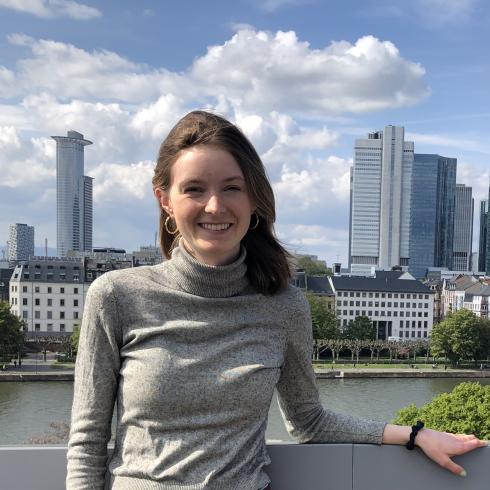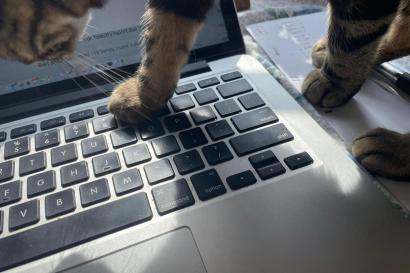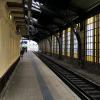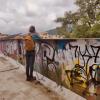The IES Abroad program in Freiburg offers the particularly unique experience of applying for, interviewing, and completing an internship in German. In German—yes. And for anyone who already has “professional working proficiency” listed on your LinkedIn profile, these five weeks will, without a doubt, make the estimation of your fluency true. My goal in this installment of long-winded observations is both to elucidate the process of interning through the IESA broad program in Freiburg, to explain what this entails—including what course and credit requirements are involved—and to share a glimpse into my own experience interning at the city’s literary cultural hub: the Literaturhaus Freiburg.
Students register for classes from home, two or three weeks before arriving in Freiburg. This is pre-registration, which means that courses are not permanent and may be changed during regular course registration, which occurs within the first two weeks of regular classes. (I say regular classes here, because there is a two week language intensive as soon as the orientation period concludes. The non grammar-based courses begin after this intensive). At this point, students interested in pursuing an internship will speak with the academic dean and the internship coordinator (Julian Zimmermann and Samuel Haubruck)—both of whom will adeptly and enthusiastically advertise the many merits of interning in your target language—and settle on a plan for landing (yes, in honor America’s new democratic presidential candidate’s election strategy let’s use the colloquial) an internship within a subject and with an organization that makes you turn cartwheels out of pure joy for the topic.
I came across the Literaturhaus while I was still at home in the U.S., googling various items of interest. I was intrigued, for one, because the concept “Literature House,” where writers come and read their books and people who read them meet in a room full of more people who’ve read the same book, is exactly where I—an English and German double major with a fair bit of creative writing thrown in—would like to spend my time, but also because I noticed that many of the writers who have either already been to Freiburg, or who were on schedule to be there precisely when I, too, was going to be in the same city, which I had read in a contemporary German literature course in the fall. I mentioned the Literaturhaus the first time I met with Samuel and Julian somewhat offhandedly, conscious that the chance of my landing a position there would be slim. Both, however, encouraged me to pursue my vision of working there. So I found the contact for inquiries on the organization’s website, and wrote her an email articulating my experience, how I had found the Literaturhaus, and my interest in interning there. I attached my resume, and I sent both to Samuel for proofreading (I did not want my first impression to be of poor grammar and sentence quality!). To my surprise, I received a response within a few days and was offered an interview.
I will skip a few details here in the interest of saving your reading time, but I will take the liberty of saying that the interview—during which, and this will never cease to amuse me, I was offered coffee in addition to the sparkling carafe of water in the middle of the table—was likely the most affirming language experiences of my first month in Freiburg. It was, of course, an interview. A form of introduction universally disliked. But I did it—successfully—in a language that first rolled across my tongue when I was fourteen, tossing a soccer ball around our basement classroom repeating: “das ist ein Fußball” “das ist Albert Einstein.”
All language students interning through the IES Abroad program in Freiburg must enroll in the accompanying internship seminar: “Intercultural Management and Global Leadership.” The course meets once per week, is generally considered a “lighter load” than other courses, and is primarily focused on providing students with support for their experience interning as Americans in Germany. The seminar itself does not begin until the final few weeks of the regular IES Abroad semester, and continues five weeks after regular semester departure. This meant (well, unless you, like me, were also enrolled in courses at the university) that the final five weeks of your time in Freiburg are a much lighter lift than the first four months. (In my case, the final few weeks were rather an intense lift, for reasons you can read about in my latest post. Still, I don’t regret taking these courses at the university. I learned a lot). The seminar required two presentations—one, more casual, after the first week of the internship, and the second, more formal, a reflection upon the whole at the end—and one cumulative paper in the form of a German Hausarbeit (not unlike the end-of-semester paper of the American system, but with a table of contents and subheadings). The course content was varied and interesting. We participated in group discussions, practiced writing German CVs and interviewing ourselves and each other. Our teacher (Dr. Verena Eichel) guided us with energy and skill. She remains a mentor and valuable resource for professional development in Germany.
My time at the Literaturhaus was a dream. I remain in awe of the people who work there, and I feel fortunate to be, to have been and to be forever, a member of their team. As an intern, I worked closely with my supervisor and coworkers to build, open and oversee a multi-sensory exhibit featuring the graphic novel Rude Girl by comic artist Birgit Weyhe. My confidence in German grew as I conversed with visitors and answered questions and went days without speaking English. I greeted guests for a reading with Deniz Utlu whose book, Vaters Meer, I had also read in the fall with my seminar. It was magic to hear these excerpts read aloud by the author himself, in a garden in the country about which and within which they were written.
I will be raving about this experience for years.
Until the next (and the last!) —
C.
As always, if you have questions—internship related, literature related, or at all Freiburg adjacent, I am happy to chat over on @carolina.unterwegs. Some fun pictures there as well.

Carolina Weatherall
I like telling stories and writing long-winded essays about my cultural observations. I generally wind up where there are books, or people talking about them, or—better yet—people celebrating queer, feminist or minoritized voices in twenty-first literature.







